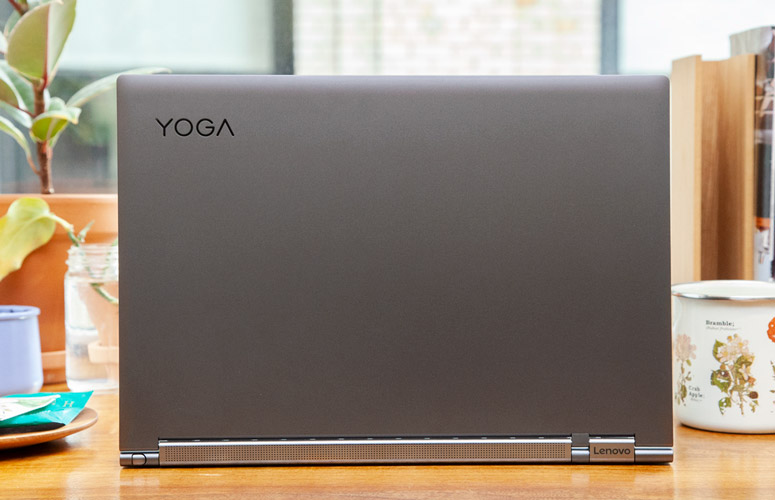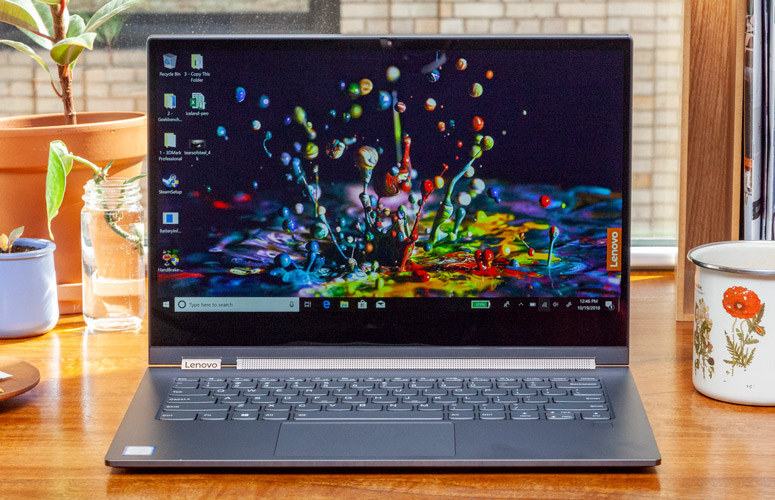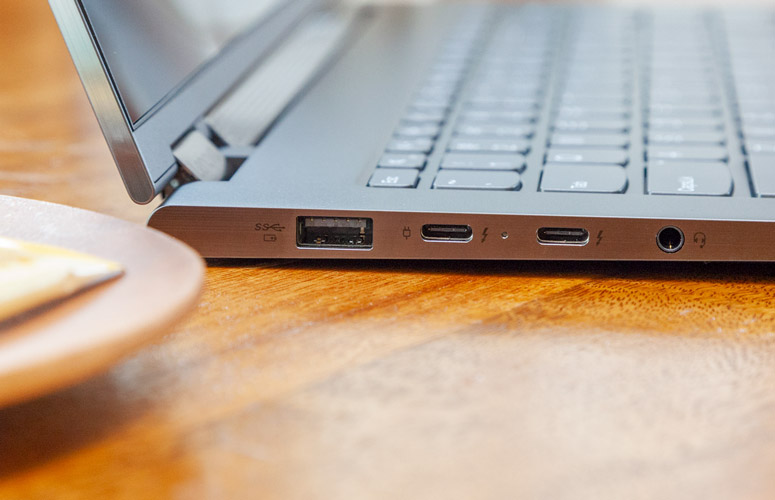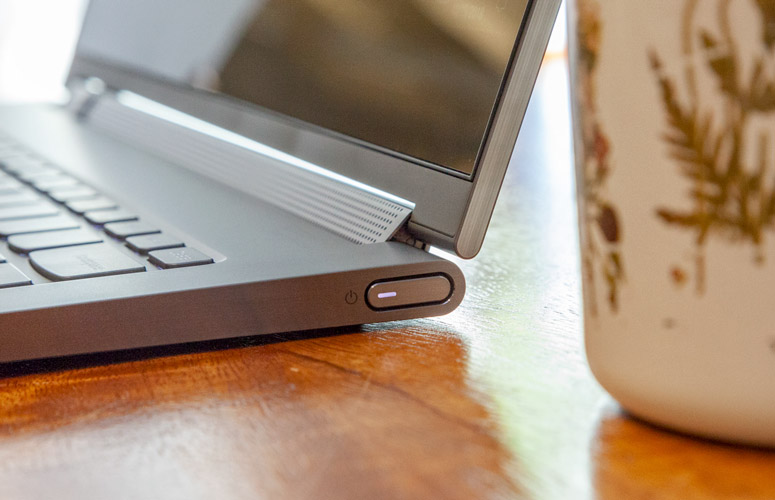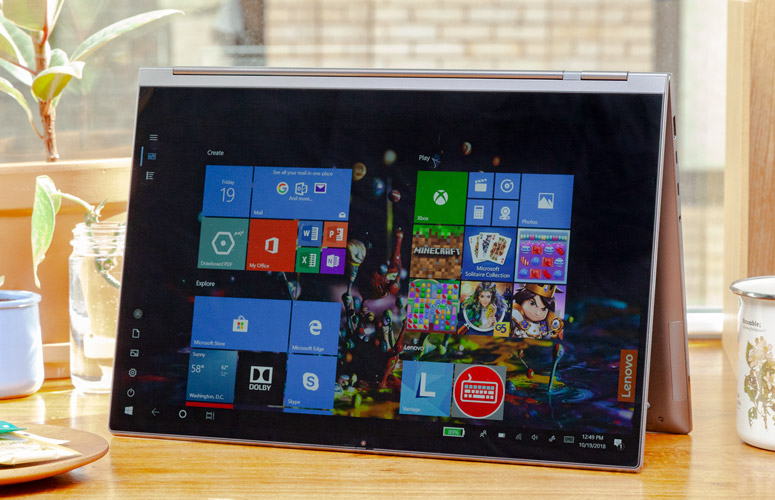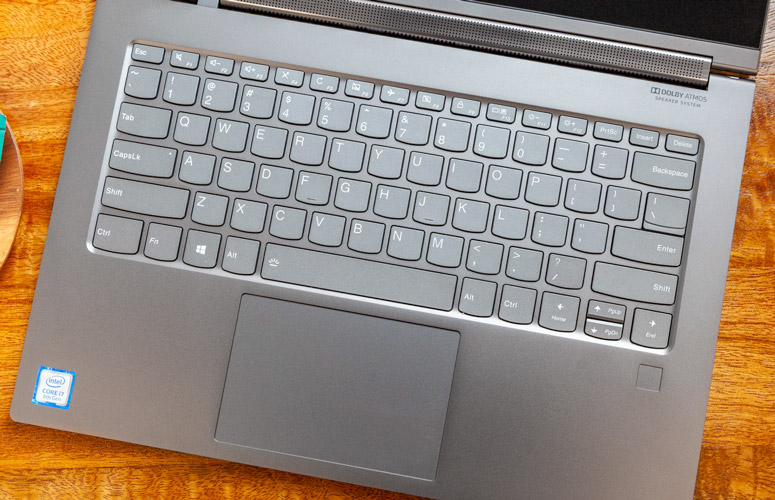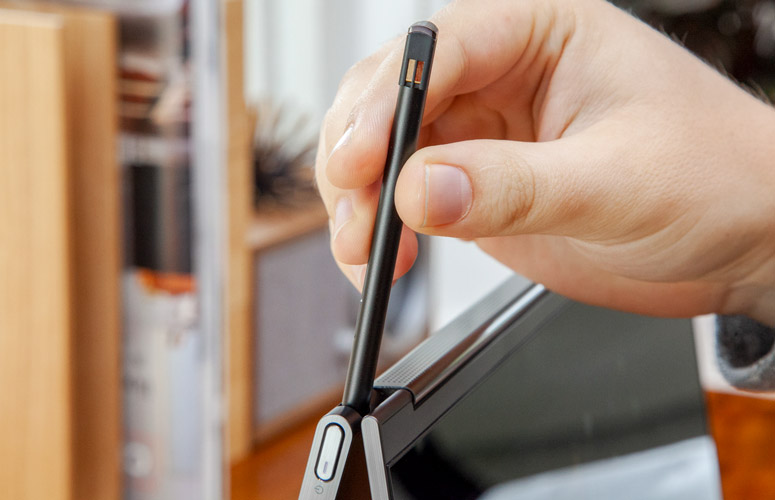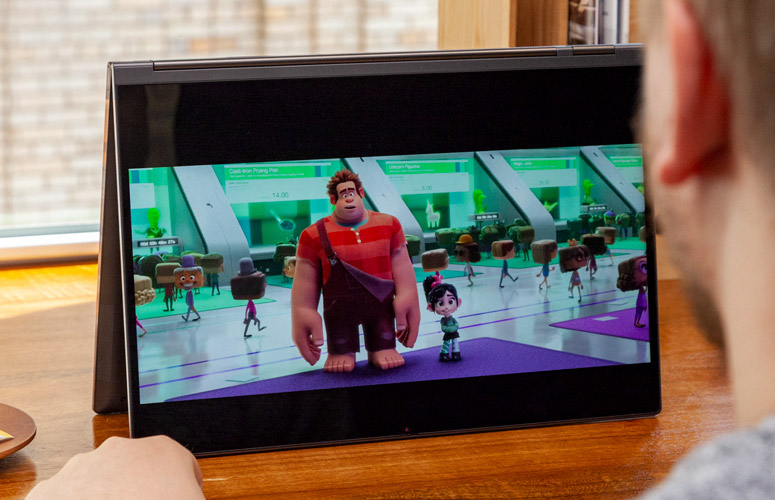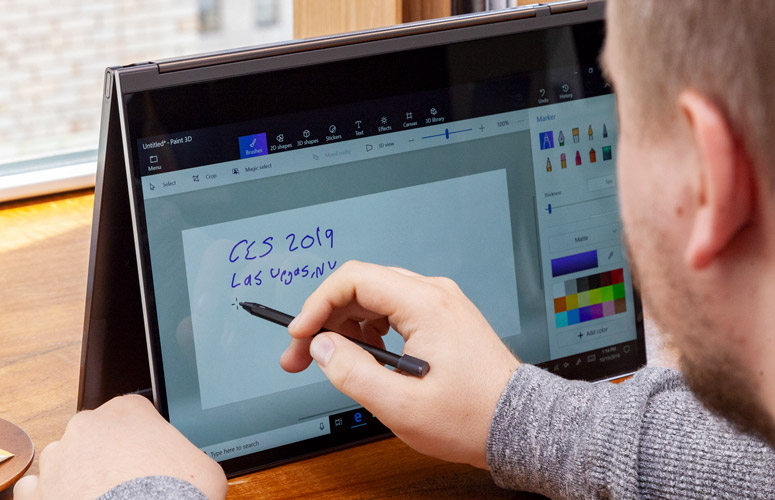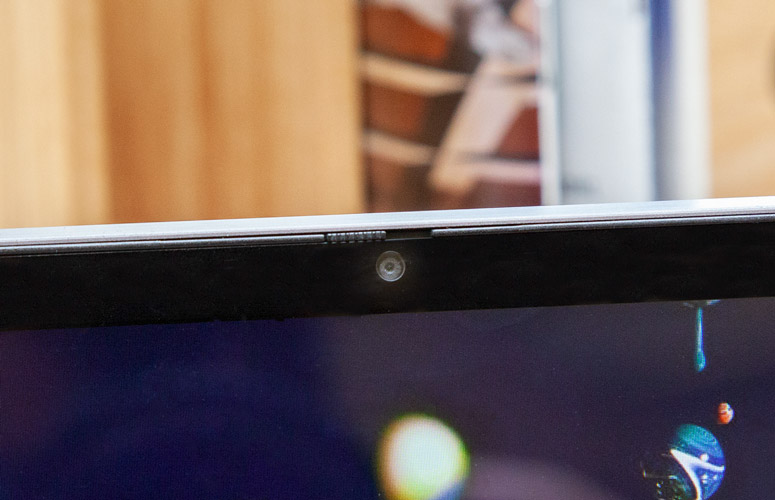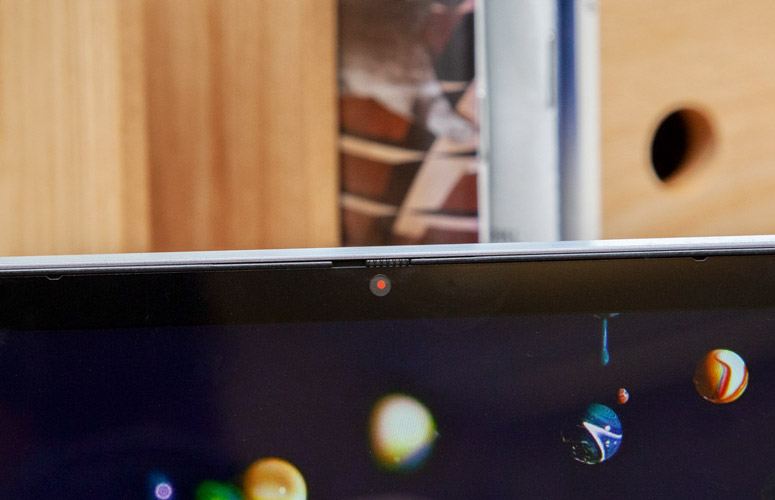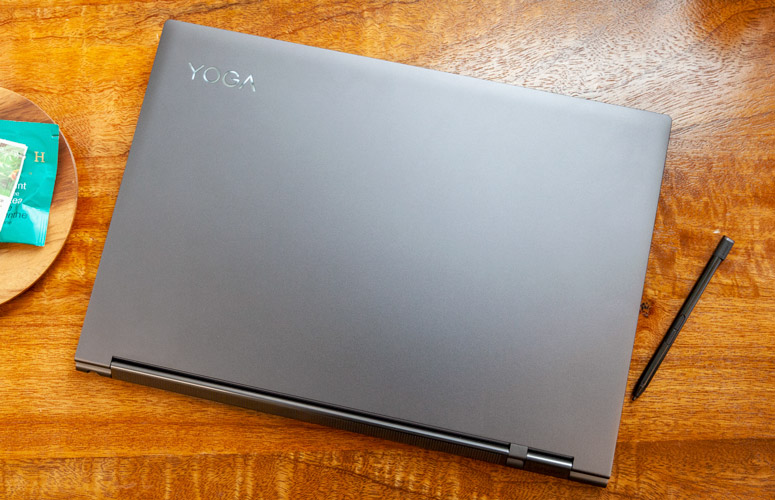Laptop Mag Verdict
The Lenovo Yoga C930 is a stylish laptop with strong performance and a versatile sound bar speaker hinge.
Pros
- +
Stylish, premium design
- +
Thin and lightweight
- +
Strong performance
- +
Long battery life
- +
Versatile speakers
- +
Webcam cover
- +
Integrated pen slot
Cons
- -
Shallow keyboard
- -
Display could be brighter, more vibrant
Why you can trust Laptop Mag
Last year's Lenovo Yoga 920 impressed us with its classy hinge, excellent display and long battery life, which is why I had high hopes for its successor, the Yoga C930. I can happily report the new convertible laptop doesn't disappoint. Apart from having upgraded components, the C930 does away with its predecessor's watchband hinge and replaces it with a more functional soundbar. The Yoga C930's utilitarian design also has a built-in slot for the included stylus and a webcam cover for added privacy.
Those additions already make the C930 a more intriguing device than its predecessor. Add lengthy battery life and a sleek design, and the C930 is undoubtedly one of the best 2-in-1 laptops around.
Design
Another Yoga, another special hinge. This year, it's substance over style. Gone is the swanky metal watchband, and in its place is a practical "soundbar" speaker. The Yoga C930 may not be as gorgeous as its mechanical forebear, but what it loses in beauty it recoups in functionality.
Dozens of tiny holes coat the smooth cylindrical surface that enables the C930's dual speakers to project sound outward no matter the laptop's orientation (more on the speaker below). As a 2-in-1, the Yoga C930 can convert from a traditional clamshell laptop into a tablet.
The Yoga 920 is a seriously sleek laptop. The razor-thin aluminum slate has a gunmetal finish on the lid and deck, and an eye-catching chrome hinge that reflects against the light. The polished earthen tones add flair and a layer of luxury to the typical silver metal laptops we so often see.
Those who prefer a minimalist design will appreciate the restraint Lenovo exercised with the Yoga C930's design. The gray lid is bare aside from a stylized chrome Yoga logo in one corner. Open the lid and you'll find the same gunmetal finish on the deck, keyboard and touchpad.
Sign up to receive The Snapshot, a free special dispatch from Laptop Mag, in your inbox.
Branding on the deck includes a faint Dolby Atmos logo and a Lenovo emblem, which sit on a secondary mini hinge a few centimeters to the left of the soundbar. An ovular power button is on the right side of the device, and a fingerprint sensor blends into the deck just under the right keyboard arrow.
The Yoga C930 may not be as gorgeous as its mechanical forebear, but what it loses in beauty it recoups in functionality.
The Yoga C930 doesn't just look premium, it feels sturdy, too. The screen didn't budge when I used the included pen, and the new hinge rotated backward with little effort.
The razor-thin bezels surrounding three sizes of the display are common for a premium laptop in 2018, but with the Yoga C930, the webcam is located above the display. However, a thick black bar borders the bottom of the screen, creating the illusion that it's floating a few inches off the deck.
MORE: Best and Worst Laptop Brands
At 12.6 x 8.9 x 0.6 inches and 3.1 pounds, the 13.9-inch Yoga C930 is larger and heavier than the 13.3-inch HP Spectre x360 (12 x 8.6 x 0.5 inches, 2.9 pounds) and the Dell XPS 13 (12 x 7.9 x 0.5 inches, 2.7 pounds). The 14-inch Asus ZenBook Flip 14 is about the same size (12.9 x 8.9 x 0.5 inches) as the Yoga C930, but a bit heavier (3.3 pounds).
Ports
The few ports offered by the Yoga C930 are found on its left side.
Those include a USB 3.1 port, two Thunderbolt 3 inputs and a headphone jack. That's it.
The right side is naked apart from a power button.
Display
The Lenovo Yoga's 13.9-inch, 1080p display is detailed, but fails to impress when compared with other premium laptops.
When I watched a trailer for the upcoming crime-thriller Destroyer, I could see the freckles and wrinkles on Nicole Kidman's distressed face. The display captured the minute details in her subtle expressions as her aggression grew throughout the gripping clip.
I saw a ton of detail in a wide shot of London in the trailer for the upcoming film The Kid Who Would Be King, but the maroon, Gryffindor-like school uniforms the children wore didn't pop. When the fighting gets going, the array of colors bursting across the battlefield looked nice, but the picture could have been more vivid. When I opened up a Google Chrome web page, the display's white balance leaned yellow, and the colors in Chrome's logo looked muted.
The Lenovo Yoga's 13.9-inch, 1080p display is detailed, but fails to impress when compared with other premium laptops.
On a positive note, I didn't have any issues using my finger or the included pen to draw pictures on the touch-screen panel.
The Yoga C930's panel covers 100 percent of the sRGB gamut, which is a definite step up from what you'll find on mainstream and budget laptops. But compared with the displays on other premium machines, the Yoga falls just short. For comparison, the Spectre x360 reproduced 109 percent of the sRGB color gamut, while the 1080p XPS 13 registered 117 percent. The ZenBook Flip 14 (115 percent) matched the premium laptop category average, which is also more colorful than the display on the Yoga C930.
MORE: Laptops with the Best Display Brightness
Display brightness isn't a strong point for the Yoga C930, either. The panel reached a maximum of 273 nits of brightness, falling short of the mark achieved by the XPS 13 (372 nits), the ZenBook Flip 14 (274 nits) and the category average (311 nits). The Spectre x360's relatively dim display (261 nits) wasn't as luminous as the competition.
Keyboard, Touchpad and Stylus
While not up to the lofty standard set by Lenovo ThinkPads, the keyboard on the Yoga C930 is decent for a laptop this thin.
That's despite the keys being relatively shallow, at 1.3 millimeters (we prefer at least 1.5 mm of key travel). A high actuation force of 75 grams gives the keys a certain weightiness, but they can feel stiff during long typing sessions. A quiet bump provides nice response when a key is registered, although I would have preferred a more clicky, audible feedback.
I have no complaints about the spacing and size of the backlit keys, and I've always been a fan of the curved keycaps Lenovo employs.
I scored 108 words per minute on the 10fastfingers.com typing test, just short of my 109 wpm average. My 89 percent accuracy rate, however, was notably worse than my typical 95 percent accuracy.
The large, 4.1 x 2.7-inch touchpad on the Yoga C930 is responsive. I used the smooth surface to quickly scroll through Google Chrome web pages and complete numerous Windows 10 gestures on my first attempt, including three-finger swipe to open apps and four-finger press to open the action center. To the right of the touchpad is a fingerprint sensor, which makes signing in easy and fast.
The stylus slides into a pen slot in the rear of the laptop, so you don't have to worry about forgetting where you placed it. The pen pops out with a satisfying click when you press in on the cap.
Audio
The C930's soundbar hinge is no gimmick -- this thing sounds great. The dual-firing speakers easily fill a medium-size room with rich, luscious audio. There wasn't the slightest hint of distortion coming from the hinge, even at max volume when I listened to Death Cab For Cutie's "Hurricane." Ben Gibbard's soothing vocals were crystal clear, and because the speakers pointed toward me, it sounded as if the popular indie artist were serenading me.
The C930's soundbar hinge is no gimmick -- this thing sounds great.
However, some of the speaker's faults were revealed when I listened to Twenty One Pilots' "Stressed Out." The vocals again sounded great, but at high volumes, the upper frequencies were sharp and aggressive on my ears. Also, I wish the bass drove a bit deeper.
MORE: Buying Headphones in: Pros and Cons of Every Type
Still, the C930 sounds better than the majority of thin laptops, and the clever hinge design means audio quality doesn't degrade when it's converted into a tablet. Also, if the sound quality isn't to your liking, you can use the included Dolby Atmos program to choose from audio presets (music, movies and games) or adjust the frequency levels yourself.
Performance
Equipped with an Intel Core i7-8550U CPU, the Yoga C930 did an excellent job on our real-world performance test, quickly loading 15 Google Chrome tabs without a hint of lag. The 2-in-1 had no problems running a full-HD stream of Fortnite on Twitch and a YouTube video of the funniest late-night talk show moments. From there, I fired up two more 1080p videos, but even those didn't phase the Yoga.
With a Core i7 CPU and 12GB of RAM, our Yoga C930 review unit scored a 13,952 on the Geekbench 4 benchmark, which determines overall performance. That tops the scores of the Spectre x360 (Core i7-8550U; 13,569), the ZenBook Flip 14 (Core i7-8550U; 12,799) and the category average (12,468), but lags slightly behind the score achieved by the XPS 13 (Core i7-8550U; 14,180).
The 256GB PCIe NVMe SSD in the Yoga C930 is fast, but competing laptops have even quicker storage. The Lenovo convertible duplicated 4.97GB of mixed-media files in 15 seconds on our File Transfer Test for a rate of 339.3 megabytes per second.
The Spectre x360 (512GB M2 PCIe NVMe MLC SSD; 565.5 MBps) and the XPS 13 (256GB; 508 MBps) trounced that time, and the average premium laptop (478.9 MBps) is also considerably faster. The ZenBook Flip 14 (512 GB PCIe SSD; 318.1 MBps) completed the same task without much urgency.
Matching 65,000 names with their corresponding address in Excel is no easy task, but the Yoga C930 needed only 4 seconds to do it. The Spectre x360 (1:36), the XPS 13 (1:08) and the ZenBook Flip 14 (1:40) took considerably longer. The average premium laptop requires 1 minute and 40 seconds to match the entries.
MORE: Laptops with the Best Overall Performance
The Yoga C930 fell only to the XPS 13 in the Handbrake test, which involves converting a 4K video into 1080p resolution. The Yoga needed 20 minutes and 45 seconds, whereas the Dell finished the task in 16 minutes. The Spectre x360 (26:00) and the ZenBook Flip 14 (25:04) couldn't keep pace, falling far behind the category average (20:07).
Graphics
Equipped with an integrated Intel UHD Graphics 620 GPU, the Yoga C930 isn't for gamers, but it can run less-demanding titles on low settings.
The convertible 2-in-1 scored a 85,758 on the 3DMark Ice Storm Unlimited graphics test, narrowly beating the Spectre x360 (UHD 620; 79,528) and the XPS 13 (UHD 620; 85,616), but falling short of the premium laptop category average (89,112). The Nvidia GeForce MX150-armed ZenBook Flip 14 topped the competition with a huge score of 110,792.
The Yoga C930 didn't fare well in our real-world gaming test, playing the racing game Dirt 3 at only 37 frames per second. That tops our 30 fps threshold, but the Spectre x360 (56 fps), the XPS 13 (67 fps) and the ZenBook Flip 14 (122 fps) did much better. The average premium laptop runs the rally racing game at 75 fps.
Battery Life
The Yoga C930 will easily get through a full day on a charge. The laptop lasted an excellent 10 hours and 10 minutes on the Laptop Mag Battery Test (continuous web surfing over Wi-Fi with display brightness at 150 nits), topping the premium laptop average (8:11). That's almost identical to the time its predecessor, the Yoga 920 (10:14), achieved.
The 1080p XPS 13 (11:59) endured significantly longer than the C930, but that clamshell laptop has a non-touch display. The Asus ZenBook Flip 14 (9:27) powered down shortly before the Yoga C930, while the Spectre x360 (8:00) struggled to make it through the day.
Webcam
Located on the thin bezel above the display, the Yoga C930's 720p webcam takes decent images. When I took a selfie in our dim office, the fairness of my skin looked accurate and I could see hints of green in my eyes. The camera even captured the tricky gray-and-black plaid pattern of my long-sleeve shirt.
Unfortunately, there was a lot of visual noise on my face and in the dark background, resulting in a blotchy image.
Save the tape -- covering the C930's webcam lens is as easy as sliding a switch. Positioned just above the camera, the new Privacy Shutter is a convenient and unobtrusive feature designed to protect you from snoopers.
Heat
Thin laptops typically get toasty under a heavy workload, but the C930 remained relatively cool when we watched a 15-minute full-HD video. The hottest location, on the bottom of the laptop near the hinge, topped out at 98 degrees Fahrenheit, just above our 95-degree comfort threshold. At 96 degrees, the center of the keyboard and the underside were also a tad warm. The touchpad remained at a comfortable 81 degrees.
Software and Warranty
The Yoga C930 comes with a pretty standard set of preinstalled apps and programs. From Lenovo, the Vantage app lets you download system updates, adjust hardware settings, run scans and search for exclusive offers on accessories. App Explorer spotlights apps and games from the Windows Store, while LenovoUtility enables special hotkey functions. There is also a program for adjusting the settings of your Yoga C930's stylus, an app for changing microphone settings and Dolby Atmos for tinkering with the speakers.
Windows 10 Home brings its own set of apps, most of which are bloatware. That's especially true of Candy Crush Saga, Hidden City and Minecraft. Other preinstalled apps include LinkedIn, Xbox and Microsoft News.
MORE: Longest Battery Life Laptops
The Yoga C930 ships with a one-year warranty. See how Lenovo performed on our Tech Support Showdown and Best and Worst Brands ranking.
How Much Does the Yoga C930 Cost?
The Yoga C930 starts at $1,399 for a 1080p display, a Core i5-8250U CPU, 8GB of RAM and a 256GB SSD. That's a steep price, but at the time of writing, U.S. customers can get our review configuration -- with a full-HD display, a Core i7-8550U CPU, 12GB of RAM and a 256GB SSD -- at Best Buy for $1,299.
If you want the best entertainment experience possible, you might want to upgrade to the 4K display. Equipped with a Core i7 CPU, 8GB of RAM and a 256GB SSD, the least expensive UHD model costs $1,519. Upping RAM to 16GB and storage to 512GB increases the price to $1,649. The top-of-the-line model, with a 4K display, 16GB of RAM and a 1TB SSD, goes for $1,839.
Bottom Line
The Yoga C930 has a gorgeous, premium design and loads of useful features, like a built-in webcam cover, a fingerprint sensor and an integrated stylus slot. Of course, the main attraction is the C930's unique soundbar hinge, which outputs very good audio even when the device is in tablet or tent mode.
Although the display could be brighter and more colorful, the C930 retains almost everything we liked above its predecessor, including long battery life and a decent keyboard.
The C930 goes up against some excellent competition, including the Dell XPS 13, which makes up for a poor webcam placement with blistering speeds, extra-long battery life and a vibrant display. If you need a 2-in-1, you should also consider the Asus ZenBook Flip 14 for its discrete graphics card and beautiful display. Overall, though, the Yoga C930 is one of our favorite premium 2-in-1s, which makes it one of the best Surface Pro alternatives.
Credit: Laptop Mag
Lenovo Yoga C930 Specs
| Bluetooth | Bluetooth 4.1 |
| Brand | Lenovo |
| CPU | Intel Core i7-8550U CPU |
| Company Website | lenovo.com |
| Display Size | 13.9 |
| Graphics Card | Intel UHD Graphics 620 |
| Hard Drive Size | 256GB |
| Hard Drive Type | PCIe NVMe SSD |
| Highest Available Resolution | 3840 x 2160 |
| Native Resolution | 1920x1080 |
| Operating System | Windows 10 Home |
| Ports (excluding USB) | USB 3.1, Headphone/Mic, Thunderbolt 3 |
| RAM | 12GB |
| Size | 12.6 x 8.9 x 0.6 inches |
| Touchpad Size | 4.1 x 2.7 inches |
| USB Ports | 2 |
| Warranty/Support | 1 year |
| Weight | 3.1 pounds |
| Wi-Fi | 802.11ac |
| Wi-Fi Model | 802.11 AC (2 x 2) |
Phillip Tracy is the assistant managing editor at Laptop Mag where he reviews laptops, phones and other gadgets while covering the latest industry news. After graduating with a journalism degree from the University of Texas at Austin, Phillip became a tech reporter at the Daily Dot. There, he wrote reviews for a range of gadgets and covered everything from social media trends to cybersecurity. Prior to that, he wrote for RCR Wireless News covering 5G and IoT. When he's not tinkering with devices, you can find Phillip playing video games, reading, traveling or watching soccer.
